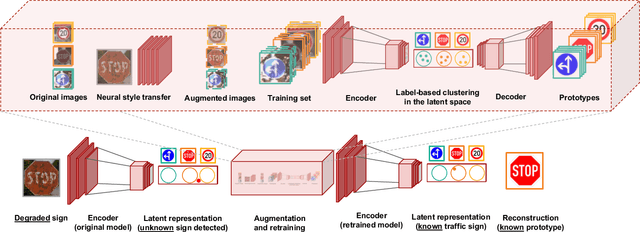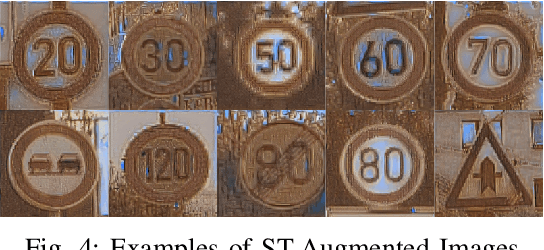Rully Agus Hendrawan
Enhancing Visual Perception in Novel Environments via Incremental Data Augmentation Based on Style Transfer
Sep 16, 2023



Abstract:The deployment of autonomous agents in real-world scenarios is challenged by "unknown unknowns", i.e. novel unexpected environments not encountered during training, such as degraded signs. While existing research focuses on anomaly detection and class imbalance, it often fails to address truly novel scenarios. Our approach enhances visual perception by leveraging the Variational Prototyping Encoder (VPE) to adeptly identify and handle novel inputs, then incrementally augmenting data using neural style transfer to enrich underrepresented data. By comparing models trained solely on original datasets with those trained on a combination of original and augmented datasets, we observed a notable improvement in the performance of the latter. This underscores the critical role of data augmentation in enhancing model robustness. Our findings suggest the potential benefits of incorporating generative models for domain-specific augmentation strategies.
Enhancing Programming eTextbooks with ChatGPT Generated Counterfactual-Thinking-Inspired Questions
Jun 06, 2023

Abstract:Digital textbooks have become an integral part of everyday learning tasks. In this work, we consider the use of digital textbooks for programming classes. Generally, students struggle with utilizing textbooks on programming to the maximum, with a possible reason being that the example programs provided as illustration of concepts in these textbooks don't offer sufficient interactivity for students, and thereby not sufficiently motivating to explore or understand these programming examples better. In our work, we explore the idea of enhancing the navigability of intelligent textbooks with the use of ``counterfactual'' questions, to make students think critically about these programs and enhance possible program comprehension. Inspired from previous works on nudging students on counter factual thinking, we present the possibility to enhance digital textbooks with questions generated using GPT.
 Add to Chrome
Add to Chrome Add to Firefox
Add to Firefox Add to Edge
Add to Edge